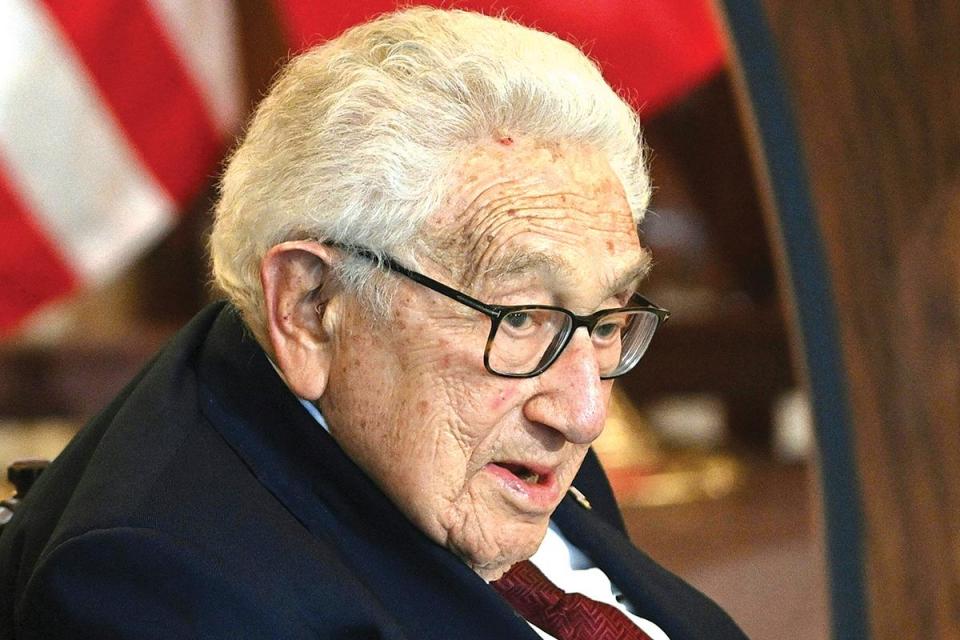Article, FEATURED STORIES, WORLD
Henry Kissinger: A Controversial Titan of Diplomacy Passes at 100

Henry Kissinger 1923-2023
Henry Kissinger, the influential and contentious diplomat who shaped American foreign policy across decades, passed away at 100. As both a celebrated statesman and a polarizing figure, Kissinger’s death marks the end of an era in global diplomacy.
Diplomatic Giant of the Cold War Era
Born in Germany in 1923, Kissinger fled Nazi persecution to the United States in 1938. His career, defined by a mix of strategic brilliance and polarizing decisions, made him a dominant figure in the Cold War diplomacy. Serving under Presidents Nixon and Ford, Kissinger was pivotal in shaping U.S. foreign policy, notably opening relations with China, engaging in arms control talks with the Soviet Union, and playing a critical role in the Vietnam War’s conclusion.
Kissinger’s diplomatic achievements were shadowed by controversy. His realpolitik approach (engaging with the world based on practical objectives rather than moral ideals) often prioritized strategic interests over human rights, leading to support for repressive regimes, notably in Latin America, and the contentious bombing campaigns in Cambodia during the Vietnam War. These actions earned him both accolades and intense criticism, with some labeling him a war criminal.
The World Reacts
Responses to Kissinger’s death reflect his complex legacy.
“I’ll never forget the first time I met Dr. Kissinger,” U.S. President Joe Biden said in a statement Thursday. “I was a young Senator, and he was Secretary of State — giving a briefing on the state of the world. Throughout our careers, we often disagreed. And often strongly. But from that first briefing — his fierce intellect and profound strategic focus was evident. Long after retiring from government, he continued to offer his views and ideas to the most important policy discussion across multiple generations.”
George W. Bush praised Kissinger for his wisdom and charm.
“America has lost one of the most dependable and distinctive voices on foreign affairs,” Bush said.
Israeli President Isaac Herzog hailed his work on the peace agreement with Egypt, while Bangladeshi Foreign Minister Abdul Momen criticized his role in the 1971 East Pakistan conflict.
Kissinger’s receipt of the 1973 Nobel Peace Prize, shared with North Vietnamese diplomat Le Duc Tho for the Paris Peace Accords, sparked controversy and remains one of the most debated awards in the Nobel history. The decision led to resignations within the Nobel committee and was perceived as premature by many, given the ongoing conflict in Vietnam.
Post-government, Kissinger remained a key figure in foreign policy, consulted by leaders, and continued his involvement in global affairs, including a recent visit to China. His writings and commentary continued to shape discourse in international relations.
His opinions on international relations and his books on diplomacy continued to influence policymakers and scholars. His involvement in global affairs remained active, with a surprise visit to Beijing in July 2023 to meet Chinese President Xi Jinping, signaling his enduring relevance in U.S.-China relations.
Beyond diplomacy, Henry Kissinger was a cultural figure known for his distinctive voice and presence in the media. His life-inspired books, documentaries, and even memes indicating his broad impact on American and global culture.
Kissinger’s Controversial Legacy in Government
Kissinger left behind a legacy marked by brilliance and controversy during his time as Secretary of State under the Nixon and Ford administrations. His approach, heavily influenced by his experiences as a Jewish refugee under the Nazis, emphasized projecting American strength against communist adversaries, often with dire consequences for nations caught in the crossfire.
In Cambodia, Kissinger’s role in the secret bombing campaign in 1969 and subsequent U.S. ground incursion remains a profound scar. The Operation Menu bombings, aimed at destroying the Khmer Rouge, were conducted without Congressional knowledge, leading to a brutal civil war and the rise of Pol Pot’s genocidal regime. In declassified conversations, Kissinger’s direct order for an all-encompassing bombing campaign starkly contrasts with his later claims that the bombings occurred in sparsely populated areas.
Kissinger’s involvement in the 1971 India-Pakistan War also drew heavy criticism. Aligning with Pakistan, he disregarded the humanitarian crisis in East Pakistan, leading to the Bangladesh Liberation War. His focus on countering Soviet influence and supporting U.S. allies, regardless of their human rights records, left a lasting impact on the region.
His actions in Latin America further tainted his record. Kissinger’s support for anti-communist dictatorships, particularly in Chile, led to the overthrow of democratically elected Salvador Allende and the rise of General Augusto Pinochet’s oppressive regime. Declassified documents revealed that Kissinger and Nixon had laid the groundwork for Allende’s overthrow, with Kissinger later admitting involvement while maintaining a public stance of non-interference.
Christopher Hitchens, in his book “The Trial of Henry Kissinger,” argued for Kissinger’s prosecution for his role in these events.
“The U.S. could either persist in averting their gaze from the egregious impunity enjoyed by a notorious war criminal and lawbreaker, or they can become seized by the exalted standards to which they continually hold everyone else.”
As the world reflects on Kissinger’s life and career, the debate over his legacy continues. His contributions to diplomacy are significant, yet the methods and consequences of his actions remain subjects of intense discussion.
Henry Kissinger will be memorialized in New York and laid to rest in Arlington National Cemetery. Kissinger is survived by his two children, Elizabeth and David, from his first marriage, as well as his wife, Nancy, whom he married in 1974.

